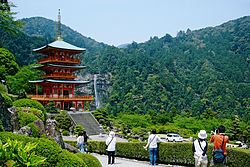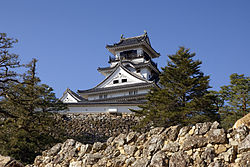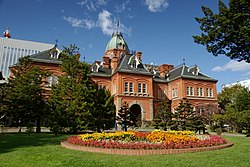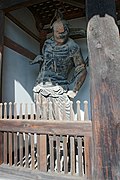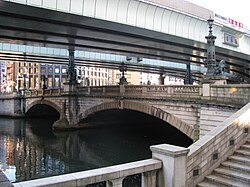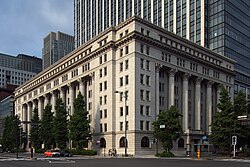Important Cultural Properties of Japan
Important Cultural Properties of Japan (重要文化財, jūyō bunkazai, important cultural properties)[note 1] is a list of items made by the Japanese Agency for Cultural Affairs. These are places and things that are especially important to the Japanese people.[1]
Types of Cultural Properties
Japan's government made a Law for the Protection of Cultural Properties a "designation system" (指定制度) to protect its culture. It chooses important items and names them as Cultural Properties[note 2] The law sets rules about changing, repairing, or exporting these items.[1]
There is also "registration system" (登録制度), which sets a lower level of protection and support for Registered Cultural Properties than for Designated Cultural Properties.
There are different levels of designation. Designation can be at a city (市定重要文化財, city designated Important Cultural Property), prefectural (県定重要文化財, prefecturally designated Important Cultural Property) or national (国定重要文化財, nationally designated Important Cultural Property) level.
Designations of a different level can coexist. For example, Sankei-en, a traditional Japanese-style garden in Naka Ward, Yokohama, owns both city designated and nationally designated Important Cultural Properties.[2]
Some Important Cultural Properties of Japan
Holy Resurrection Cathedral in Tokyo
The Former Hokkaidō government office building
Tsurugaoka Hachiman-gū in Kamakura, Kanagawa prefecture
| Wikimedia Commons has media related to Lua error in Module:Commons_link at line 62: attempt to index field 'wikibase' (a nil value).. |
Important Cultural Properties Of Japan Media
Nihon Bridge in Nihonbashi, Tokyo
Meiji Seimei Kan in Tokyo
Notes
References
- ↑ 1.0 1.1 "Cultural Properties for Future Generations" (PDF). Administration of Cultural Affairs in Japan ― Fiscal 2009. Agency for Cultural Affairs. June 2007. Archived from the original (PDF) on 2009-03-27. Retrieved 2012-04-22.
- ↑ Yokohama Sankei Garden Archived 2017-04-30 at the Wayback Machine, Sankei-en's official site accessed on November 3, 2009 (in Japanese)

